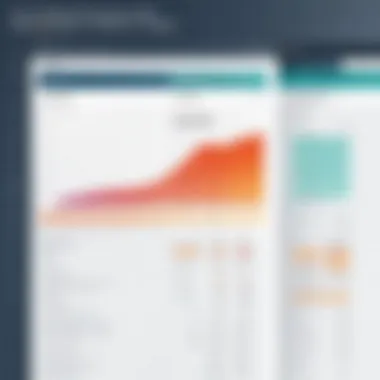Understanding Tableau Desktop License Types Explained


Intro
Navigating the landscape of software licenses can be intricate, especially for a powerful tool like Tableau Desktop. This guide aims to shed light on the various license types available, primarily focusing on how they serve different user needs. Understanding these options is key for both individuals and organizations seeking to maximize the benefits of using Tableau for data analysis and visualization.
When approaching Tableau's licensing structure, it's important to clarify the distinctions between personal and organizational licenses. Each type carries implications for usability, access, and collaboration, making it essential to choose the right one for your specific situation. This guide does not only highlight the differences but also assists you in making informed decisions based on your requirements.
By the end of this article, readers will have gained insights into the practicalities of choosing between license types, ensuring that they are equipped to utilize Tableau Desktop effectively for their unique goals.
Preface to Tableau Desktop
Tableau Desktop is a powerful data visualization tool that allows users to create interactive and shareable dashboards. It helps in transforming raw data into insightful visuals, making it an essential asset for organizations focusing on data-driven decision-making. The significance of this article lies in its deep dive into the licensing types for Tableau Desktop, which can dictate how and when this tool is used.
One of the key aspects of Tableau Desktop is its flexibility in terms of licensing. Different users have various needs based on their roles, whether they are individual analysts, part of a team, or involved in broader organizational tasks. Understanding the available license types is crucial. It helps users determine which license will not only fit their budget but also fulfill their specific requirements.
Additionally, there are several benefits associated with Tableau Desktop. Users can handle large volumes of data, perform complex analyses, and collaborate easily with others. However, these capabilities may vary significantly depending on the type of license selected. Therefore, licensing choices can directly affect functionality, features, and overall utility.
In light of this, it's vital to consider how licensing impacts access to updates, support, and community resources. A deeper grasp of these elements equips users with the knowledge to make informed choices, ultimately leading to better data insights and more effective use of Tableau.
"Choosing the right license for Tableau Desktop can optimize both cost and functionality."
This section intends to set the context for the subsequent detailed discussions on the importance of license management, the various types of licenses available, and how users can select the best fit for their situational needs.
The Importance of License Management
Effective license management in Tableau Desktop is pivotal for any organization aiming to leverage its data visualization capabilities. This process involves not only acquiring the right licenses but also understanding their utilization, compliance, and cost-effectiveness. Proper management of licenses can lead to significant benefits for both individuals and teams.
Why License Type Matters
The type of license chosen directly influences how users interact with Tableau Desktop. Each license type serves specific purposes, catering to various user levels and organizational needs. If a user selects an individual license when they require a team license, they may miss out on essential collaborative features. Understanding the distinctions, such as Personal, Team, and Enterprise licenses, is critical. For example:
- Personal Licenses are suitable for independent use.
- Team Licenses facilitate sharing and collaboration among multiple users.
- Enterprise Licenses provide extensive management tools for larger organizations.
By recognizing which license type aligns with their professional activities, users can maximize their investments. According to Tableau's official documentation, mismatched license types can lead to underutilized software capabilities, resulting in inefficiencies.
Impact on Functionality and Features
The functionality provided by Tableau Desktop depends heavily on the license type. Users with Personal Licenses typically have access to a basic set of features. This can limit data sharing and collaboration. On the other hand, Team and Enterprise Licenses unlock advanced features, allowing for:
- Real-time collaboration options.
- Enhanced sharing capabilities across teams.
- Greater access to tools necessary for data management and governance.
By examining these differences, it becomes clear that selecting the appropriate license type is not just a matter of cost but also a strategic decision that can impact productivity and creativity. > "Choosing the right license for Tableau Desktop can make a profound difference in how data insights are generated and shared within your team."
For users who are in the IT field, understanding these elements can facilitate better decision-making. It empowers organizations to utilize Tableau's full potential, leading to enhanced data-driven strategies.
Overview of Tableau Desktop License Types
In the realm of data visualization and analysis, understanding the various license types of Tableau Desktop is crucial for both individuals and organizations. Each license type serves specific user needs and impacts functionality and features available to the user.
This section aims to illuminate the landscape of Tableau Desktop licenses, focusing on Individual, Team, and Enterprise Licenses. Recognizing the nuances between these licenses enhances the ability to choose the most suitable option based on professional requirements and business objectives.
Individual Licenses
Individual licenses are tailored for single users, and they generally cater to those who engage with Tableau Desktop on a personal level. These licenses allow users to create and share interactive dashboards and reports directly. In this context, notable benefits include accessibility to all main features of the software, such as data blending and ad hoc analysis.
However, it is important to acknowledge the limitations too. Users of individual licenses may have restricted sharing capabilities compared to organization-level licenses, especially when it comes to Tableau Server or Tableau Online. Additionally, updates and support might be less pronounced than for larger organizational licenses.
Team Licenses


Team licenses facilitate an environment of collaboration among smaller groups within organizations. They support teamwork by granting several users the ability to collaborate on projects seamlessly. One significant advantage of team licenses is the enhanced collaborative features they provide. Users can collectively access shared dashboards, fostering a dynamic working relationship among team members.
Another consideration is the cost associated with team licenses, which can vary depending on the number of users and the specific features desired. Teams should weigh the potential of collective productivity against the overall budget.
Enterprise Licenses
Enterprise licenses are designed for organizations with large-scale needs, providing comprehensive management tools and features. These licenses allow for enterprise-level management, which includes advanced data governance and user administration. The large-scale nature of many businesses necessitates tools that support robust compliance and security features.
An enterprise license does offer the broadest capabilities when it comes to analytics and reporting. However, organizations must be mindful of the cost implications, as enterprises may need to invest substantially in order to take full advantage of all features offered.
Detailed Analysis of Individual Licenses
Understanding individual licenses for Tableau Desktop is essential because it directly affects how users can access and utilize the software. Individual licenses allow a singular user to perform data visualization and analysis but come with specific benefits and limitations that must be considered. This section provides a nuanced exploration of what individual licenses offer and the pertinent constraints tied to them.
Personal Use Benefits
Individual licenses of Tableau Desktop are tailored for personal use and can serve both casual users and more serious data analysts. The primary advantage of holding an individual license is the flexibility it offers. Users can leverage Tableau's powerful data visualization capabilities to analyze personal projects, academic studies, or any data-centric tasks they encounter.
Key benefits include:
- Ease of Access: Users can install Tableau Desktop on personal machines without navigating complex enterprise-level deployment processes.
- Full Control: Individual users have exclusive access to their workbooks, ensuring that their unique data analyses remain private.
- Cost-Effectiveness: Individual licenses tend to be less expensive compared to team or enterprise-level licenses, making it a financially viable option for solo users.
- Skill Development: Working individually allows users to enhance their data visualization skills at their own pace.
These benefits position individual licenses as a suitable choice for many professionals and students looking to deepen their understanding of data relationships and storytelling through visual means.
Limitations of Individual Licenses
While there are clear strengths in opting for an individual license, there are notable limitations. Users should carefully evaluate these aspects, especially when considering future projects that may benefit from collaboration or support.
Consider the following:
- Limited Collaboration: Individual licenses lack the collaborative features found in team licenses. Users cannot easily share work or collaborate in real-time with others, which can hinder teamwork.
- Reduced Access to Resources: Individual users do not typically receive the comprehensive support and resources that come with higher-tier licenses. This may include advanced training materials and customer support.
- Single User Dependency: The performance and effectiveness of the license are tied solely to one user. If the user becomes unavailable, tasks may stagnate due to the absence of other collaborators.
- No Scalability: For users looking to grow their data projects or integrate with larger teams, individual licenses may not scale well with organizational demands.
Individual licenses offer a unique entry point into the world of data analytics but require users to be aware of their limitations. Understanding these factors is crucial for future planning and effectiveness in data-driven environments.
In-Depth Look at Team Licenses
Team licenses for Tableau Desktop allow multiple users to collaborate on data projects, making them ideal for organizations with a team-oriented approach. Understanding the benefits and costs associated with team licenses is crucial for making informed decisions.
Collaborative Features
Collaborative features are a definitive strength of team licenses. Teams can work together in real-time, sharing insights and building on each other’s analyses. This collaboration is facilitated through shared workbooks and dashboards.
Users can publish their work to Tableau Server or Tableau Online, allowing fellow team members to access, edit, and comment on live data visualizations. This leads to a more integrated data analysis process where insights can be discussed and refined collaboratively.
Additionally, the integration with various data sources enables teams to gather information from diverse origins. This means team members can contribute their expertise, enhancing the quality of analysis performed.
Other features include version control, ensuring that teams work off the most recent updates and maintain a history of changes. This minimizes the risk of errors that can occur in isolated environments.
Team License Costs
Cost considerations play an important role when selecting the right license. Team licenses tend to be more expensive than individual licenses but offer greater flexibility and features that benefit multiple users.
Organizations should evaluate the total cost against the benefits provided. Here are key factors to consider:
- Number of Users: The more users involved, the more the cost will scale. Analyze how many members will need access to the software.
- Volume of Data: High data volume requirements may affect costs as larger data sets may necessitate advanced features or performance metrics.
- Support Services: Some packages include additional support or training for users, which can lead to further costs. Assess if such services are necessary for your team.
"Investing in a team license not only enhances collaborative efforts but also fosters a culture of data-driven decision making within the organization."
Ultimately, understanding the costs and collaborative features of team licenses is essential for organizations looking to maximize their Tableau Desktop experience. By carefully weighing these factors, teams can better harness the power of data analytics.


Understanding Enterprise Licenses
Enterprise licenses for Tableau Desktop cater to organizations that require scalability, robust functionality, and enhanced collaboration among users. This license type is crucial for businesses of varying sizes, particularly those in sectors where data-driven decision-making is paramount. The purchase of an enterprise license typically signifies a strong commitment to data analytics and reinforces the need for comprehensive management tools that can handle large datasets across multiple users.
One of the most significant benefits of enterprise licenses is their capability to facilitate centralized management, streamlining both user administration and access control. This level of oversight becomes increasingly essential as the organization expands or when various departments start using the software for data analysis. It ensures that only authorized personnel have access to sensitive data, thereby enhancing both efficiency and security.
Enterprise-level Management Tools
Enterprise-level management tools in Tableau Desktop are designed to provide administrative controls that support larger teams and organizations. These features often include user access management, data source governance, and the ability to monitor user activity.
- User Access Management: This feature allows administrators to assign roles and permissions to users based on their specific functions. This capability is essential for maintaining data integrity and ensuring that users only access information pertinent to their roles.
- Governance Tools: With adequate governance tools, organizations can manage who can modify or publish data sources. This ensures that everyone is working with accurate and up-to-date information, reducing the risk of errors and misunderstandings.
- Activity Monitoring: This function enables tracking how users interact with Tableau Desktop. Administrators can identify usage patterns, which help in resource allocation and training needs.
Enterprise management tools not only foster organization, they also enhance the overall user experience by reducing redundancies and potential data mishaps.
Compliance and Security Features
In today's regulatory environment, compliance and security are no longer optional but rather essential for every business. Tableau Desktop's enterprise licenses come with built-in compliance and security features that protect data integrity while ensuring adherence to various legal standards.
- Data Encryption: Enterprise licenses offer encrypted connections for data transfer, allowing sensitive information to remain secure during transmission.
- User Authentication: Robust user authentication methods ensure that only verified individuals can access the Tableau environment. This adds a crucial layer of security, particularly in industries subjected to strict data privacy regulations.
- Regulatory Compliance: Using an enterprise license enables organizations to comply with laws, such as GDPR and HIPAA, which regulate how personal and sensitive data must be managed.
In summary, selecting an enterprise license for Tableau Desktop not only equips organizations with advanced analytical tools and capabilities but also fortifies their data management practices through comprehensive security and compliance features.
Selecting the Right License for You
In the current landscape of data analytics, selecting the correct Tableau Desktop license is crucial. A well-informed decision can enhance productivity and streamline workflow. Each license type caters to different user scenarios, making it essential to tailor your choice according to your specific situation. Choices should align not only with individual preferences but also with business goals. This section will provide insight into how to comprehensively assess your needs and understand the cost implications associated with different license types.
Assessing Your Needs
Determining your requirements involves several factors. First, consider the scope of your projects. Is the usage focused on personal, self-driven analytics, or is there a demand for team collaboration? Individual licenses may suffice for straightforward tasks while team licenses offer collaborative tools vital for team-oriented environments. You should also analyze your skill level and the complexity of data you will handle. Users with basic needs might thrive under a basic license while those dealing with high-level analytics would benefit from advanced features found in team or enterprise licenses.
To assess your needs effectively, here are some points to consider:
- Frequency of Use: Will you be using Tableau daily or sporadically?
- Team Collaboration: Are you working with a team that requires shared access and functionalities?
- Type of Data Sources: Will you integrate multiple data sources or focus on one?
- Level of Analysis: Are you performing basic visualizations or complex data modeling?
Each of these factors plays a role in identifying the best license type for your usage, ultimately aiding in budgeting and project planning.
Cost Considerations
Cost is invariably a core component when selecting a Tableau Desktop license. Understanding the financial implications can guide users to make sustainable choices. Individual licenses typically incur lower initial costs but may not provide the extensive features or support options of team or enterprise licenses. Team licenses offer a more collaborative environment at a higher price, but this cost may be justified by enhanced productivity and advanced tools available to a group.
Here are several cost-related aspects to ponder when selecting a license:
- Initial Licensing Fees: Pricing varies by type; individual fees differ from team and enterprise rates.
- Subscription Model: Most licenses operate on a yearly subscription, which can create ongoing costs.
- Upgrade Costs: Transitioning from a basic to a more advanced license might involve additional charges.
- Value of Features: Compare features offered across licenses to assess if the benefits justify the expense.
"Choosing a license is not merely about price; it’s about value relative to your needs."
Common Questions About Tableau Licensing
Understanding licensing can be complex. This section addresses common queries about Tableau licenses. It aims to clarify doubts that potential and current users may have. Such questions help users make informed decisions and understand their options better. Knowing how different licenses work is vital to effectively utilize Tableau Desktop for individual or organizational purposes.
Can Licenses Be Shared?
This question arises frequently among users considering different license types. In general, Tableau licenses are assigned to individual users. Sharing licenses is often not allowed. This restriction ensures that each user has full access and supports accountability in usage.


However, organizations may have a pool of licenses that can be shared among team members. This is common in team or enterprise licenses, but the sharing method is controlled. Users must check with their organization’s policy on this matter, as rules may vary. Proper management of licenses prevents overuse and ensures compliance with Tableau’s terms.
It is important to understand the legal implications of sharing licenses. Late or any violation could lead to issues with licensing compliance. This may result in penalties or restrictions on user access.
Upgrading License Types
Upgrading license types can be an important consideration for users who need additional features or capabilities. Many users start with an individual license. As their needs grow, they may need to switch to a team or enterprise license. The process of upgrading is typically straightforward but understanding it requires attention to detail.
When considering an upgrade, users must evaluate their current and projected needs. Here are some factors to think about:
- Additional Features: Higher license types provide more robust functionalities.
- User Requirement: If collaborating with a larger team, an upgrade may be necessary.
- Budget: Upgrades come with additional costs. Ensuring the budget can accommodate this is essential.
- License Management: Upgrading may involve a different management strategy within the organization.
Communicating with Tableau's support team or your license provider can help clarify the upgrade process. Each organization may have different guidelines based on their existing story structure.
Ultimately, understanding these common questions helps users navigate licensing options effectively. It establishes a foundation for deciding which license fits their requirements, whether for personal use or within a larger team framework.
Closure
In this guide, we have navigated through the complex landscape of Tableau Desktop licensing, emphasizing its critical importance for users ranging from individuals to large organizations. The choice of the appropriate license type can significantly impact the way users interact with Tableau and the value it brings to their work.
Summing up Tableau Desktop Licenses
To summarize, Tableau offers several license options: Individual, Team, and Enterprise. Each of these has tailored features suited to different user contexts. Individual licenses are excellent for personal projects, allowing for exploration and analysis of data without team collaboration. Team licenses, on the other hand, foster collaboration, making them ideal for groups engaging in joint data efforts. Enterprise licenses provide a robust management framework suitable for large organizations, focusing on compliance and security.
- Individuals: Best suited for personal use with limited features but sufficient for data analysis on a smaller scale.
- Teams: Allow for sharing, collaboration, and project management, hence suitable for group efforts.
- Enterprises: Cater to large businesses with sophisticated needs covering compliance, security, and advanced features for efficient data governance.
This distinction enables users to align their specific needs with the capabilities offered under each license type, ensuring they maximize the value derived from Tableau Desktop.
Final Thoughts on Choosing a License
When determining which Tableau license to opt for, several factors merit consideration. First, evaluate the scale of data projects and collaboration needs. Individual users might benefit most from the streamlined, straightforward features of an Individual license. Teams that require frequent collaboration will find the Team license more fitting, while businesses looking for extensive support and management tools should explore an Enterprise license.
Additionally, assess budget constraints. The licensing costs vary and must align with organizational budgets while balancing feature needs. Considering the long-term scalability of the tool is also critical; as projects grow, so do the demands on licensing capabilities.
Choosing the right Tableau license is essential for unlocking the full potential of data visualization and analytics in your context.
Appendix: Additional Resources
In any comprehensive guide, an appendix proves to be a crucial element. This section collects essential resources that can augment the reader's understanding of Tableau Desktop licenses. Providing access to relevant information can assist users in making informed decisions. Good resources empower both new and experienced users by ensuring they have the most current knowledge and tools at their disposal.
Official Tableau Documentation
The official Tableau Documentation serves as the primary source of truth regarding product features, installation processes, and troubleshooting. It is meticulously maintained and updated by Tableau itself. Readers can find detailed guidelines on how to use various licensing models effectively. This documentation also includes best practices that can enhance user efficacy.
Here are some specific benefits of utilizing the official documentation:
- Comprehensive Guides: Covers every aspect of Tableau ranging from starting guides to advanced functionalities.
- Updates and Changes: Keeps users informed about the latest updates. Tableau frequently improves its product, and the documentation ensures that users do not miss critical changes.
- Support Resources: Links to contact support or access community help is valuable for resolving any licensing issues.
Direct access to the Tableau Documentation can be found here: Tableau Official Documentation.
Community Forums and User Groups
Engaging with Community Forums and User Groups can be invaluable for any Tableau user. This is where practitioners discuss practical experiences and troubleshooting techniques. Community forums offer a platform for sharing insights, solutions, and even licensing concerns that often arise in real-world use.
Benefits of participating in these forums:
- Peer Support: Users can ask questions and receive help from others who may have faced similar challenges.
- Networking Opportunities: Engaging in discussions creates opportunities for networking with other professionals in the field.
- Free Resources: Many community members share tutorials and other resources that are not available in formal documentation.
Popular places to connect include the Tableau Community and Reddit forums. For instance, visiting the Tableau subreddit may provide insights that enhance the Tableau experience.
"By integrating insights from the community and following the official guidelines, users can achieve a higher level of proficiency with Tableau Desktop."







